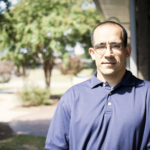
05 Feb Engaging Brokenness with Love and Truth
We need a vision for living on mission for God, that is bigger than service projects and mission trips. And that starts with this truth:
Being culturally engaged is not about a service project. It’s first about love.
You can see a great model of this in the Gospel of John, chapter 4, where Jesus meets and engages a Samaritan woman. Now, you first have to understand the cultural context. The divide between Jews and Samaritans in that day vastly surpasses anything we see in our country—between rich and poor, or between any ethnic groups. Jews were to avoid Samaritans and not associate with them. Even more, Jews didn’t even think Samaritans weren’t even worthy enough to associate with. And even more than that, Jews didn’t even think it was worth thinking about why they wouldn’t associate with them. The Jews despised Samaritans, and everyone knew it.
So what did Jesus do? He purposely went into the Samaritan region, paused to spend time there, and, when a Samaritan woman approached, He spoke to her.
Over the next 14 verses, we see Jesus engaging her in conversation, getting to know her, and even helping her to know herself. Finally, Jesus communicates a message of salvation: “For God is Spirit, so those who worship him must worship in spirit and in truth. . . I AM the Messiah!”
We can learn three things from Jesus, as we seek to engage the culture around us: Take initiative, be needy, and don’t be ashamed of the truth.
Take initiative
Jesus was intentional in where He went, and who He talked to. We have to intentionally put ourselves in uncomfortable situations, to establish a beachhead in other people’s lives, even at great sacrifice. We have to embrace ambiguity, and go where others are. I’m all about serving in areas of our own gifts and passions, but maybe we limit seeing God work in powerful ways because we refuse to go outside our comfort zones.
Be needy
Did you catch how Jesus asked the woman for water, when He could have gotten it for Himself? One time soon after we moved to Allendale, I was doing some work around our house. I needed a small drill bit, and I had two choices: go to the hardware store or borrow one from a neighbor. I chose the latter, and after coming up empty at a dozen or so houses, I spotted a man down the road, in his front yard washing his car. I went over, introduced myself, and he happily let me borrow his drill bit set. It turns out this family became some good friends of ours—I later coached his son in football, and we partnered together to run an after school program at his church.
Don’t think of culturally engaged as a “soup kitchen” model, where one side brings everything and the other side only takes. Think of it as a “potluck,” where everyone brings something to the table. If you want to develop a meaningful impact, make sure everyone contributes from their God-given strengths and resources.
This will require you to be humble. You’re going to have to admit that you don’t have it all together. Here’s a good way to start: the next time you need something (an ingredient for a recipe, or some tool, etc), don’t solve your own problem. Ask a neighbor to supply your need.
Don’t be ashamed of the truth
Jesus wanted this woman to come to a saving knowledge of God, and we each have family and friends we hope will come to know Jesus. I’m not saying that the first words out of our mouth needs to be the “Romans Road” plan of salvation. I’m not saying that the first thing you share with them is a gospel tract, or even an invitation to your church. Discipleship (which evangelism is certainly a subset of) is best done in the context of a relationship.
However, perhaps we wait too long before introducing the God’s truth to our conversations. If you spend six months or a year building a relationship before you introduce the topic of church, they may think that church isn’t that important. If Jesus really is that important to you, why would you wait until your 20th conversation with them before you bring Him into the conversation?
God has given us eternal life. By His grace, we have eternal life and the Spirit who indwells us (Titus 3:6-7). Now that you live in that grace, devote yourselves to doing good (v. 8), as you engage a broken world with love and with truth.

Joey Espinosa
Joey eats oatmeal every day for breakfast. He also wants to warn you that his daughter now is eligible to drive, and it doesn’t help that he was her instructor. Joey attends the Downtown campus.


